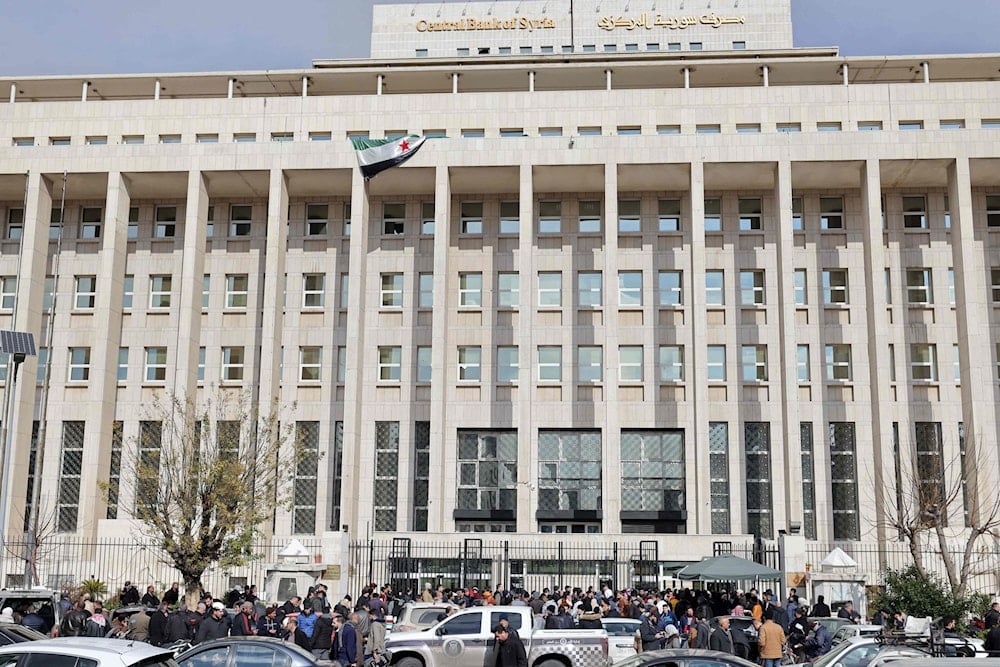New Syrian central bank chief pledges greater independence: Reuters
Syria's new central bank governor, Maysaa Sabreen faces significant challenges, including stabilizing Syria’s currency, curbing inflation, and revitalizing the financial sector.
-

Vehicles move past as people queue outside the main headquarters of the Central Bank of Syria to exchange US dollars at prices lower than the black market, Damascus, Syria, Dec. 30, 2024 (AFP Photo)
Syria's new central bank governor, Maysaa Sabreen, has expressed her intention to enhance the institution's independence in monetary policy decisions, Reuters reported Tuesday.
Sabreen, formerly the deputy governor of the Central Bank of Syria, assumed the position in a caretaker capacity following the departure of her predecessor, Mohammed Issam Hazime, late last year.
Her appointment is notable, as she is among the few senior state officials promoted after the swift offensive by Syria's new Islamic rulers led to President Bashar al-Assad's ousting on December 8.
In her first media interview since taking office, Sabreen told Reuters that "the bank is working on preparing draft amendments to the bank's law to enhance its independence, including allowing it more freedom to make decisions regarding monetary policy."
However, she acknowledged that these changes would require approval from Syria's new governing authority, with no clear timeline for implementation.
Central bank independence is essential for achieving long-term macroeconomic and financial stability, economists have noted.
Sabreen also outlined plans to expand Islamic banking in Syria, aiming to attract citizens who have avoided traditional banking services.
"This may include giving banks that provide traditional services the option to open Islamic banking branches," said Sabreen, who has two decades of experience at the institution.
She stressed the bank's commitment to avoiding the need to print more Syrian pounds, which could exacerbate inflation.
When asked about the country’s foreign exchange and gold reserves, she declined to provide specifics, noting that a balance sheet review is underway.
However, sources informed Reuters in December that the central bank holds nearly 26 tons of gold, valued at approximately $2.2 billion, along with $200 million in foreign currency reserves and a substantial amount of Syrian pounds.
The Central Bank of Syria and several former governors remain under US sanctions imposed in the wake of anti-government protests in 2011, which escalated into a prolonged war on the country.
Despite these restrictions, Sabreen assured that the central bank has sufficient funds to cover civil servant salaries, even after a 400% wage increase promised by the new administration.
Reuters previously reported that Qatar would assist in financing the public sector wage hike, facilitated by a US sanctions waiver granted on January 6, allowing transactions with Syrian governing institutions.
Tackling inflation and currency stabilization
Sabreen faces significant challenges, including stabilizing Syria’s currency, curbing inflation, and revitalizing the financial sector. The Syrian pound has plummeted from around 50 pounds per US dollar in late 2011 to over 13,000 pounds per dollar as of Monday, according to LSEG and central bank data.
A World Bank report from spring 2024 estimated that Syria’s annual inflation surged by nearly 100% year-on-year in 2023. Sabreen stated that the central bank is focusing on restructuring state-owned banks and introducing regulations for money exchange and transfer services, which have become vital sources of foreign currency.
During al-Assad's tenure, foreign currency usage was heavily restricted. However, recent US sanctions exemptions for humanitarian aid, energy transactions, and remittances aim to stabilize the country and improve essential services.
Although the central bank itself remains under sanctions, Sabreen welcomed the decision to permit personal remittances from Syrians abroad, expressing hope for the eventual lifting of all restrictions to reconnect Syria’s banks to the global financial system.
Read more: Six EU members advocate for temporary suspension of Syria sanctions

 4 Min Read
4 Min Read








